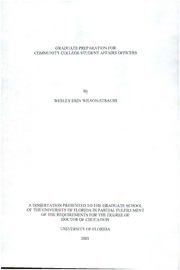
Graduate preparation for community college student affairs office PDF
Preview Graduate preparation for community college student affairs office
GRADUATEPREPARATIONFOR COMMUNITYCOLLEGESTUDENTAFFAIRSOFFICERS By WESLEYERINWILSON-STRAUSS ADISSERTATIONPRESENTEDTOTHEGRADUATESCHOOL OFTHEUNIVERSITYOFFLORIDAINPARTIALFULFILLMENT OFTHEREQUIREMENTSFORTHEDEGREEOF DOCTOROFEDUCATION UNIVERSITYOFFLORIDA 2005 ACKNOWLEDGEMENTS Iwouldliketothankthefollowingpeoplewhowerealsoinstrumentalintheir unconditionalloveandsupportduringmypursuitofthisdegreeandthewritingofthis dissertation:myparents,BillandSueWilson;bestfriendsDeborahRomeoandMegan Mead;bestfriendsKimandEricJacobs;and,membersofthefacultyandstaffatSan AntonioCollegeandAustinCommunityCollegeforvaryingareasofexpertiseand advice. Myappreciationalsogoestomycommitteewhichhassurvivedmorethana committeeoughtto. TheyhavechallengedmetonotonlyliveuptothedegreewhichI amcompletingbutencouragedmeattimesandplaceswhentheendseemedalmost impossible. MysincerestappreciationgoestoArthurSandeen,chair;BarbaraKeener; JeanneRepetto;andDavidHoneyman. Thisdissertationisdedicatedtomyhusband,MichaelA.Wilson-Strauss,who witheightyearsofloveanddevotionhasensuredthestart,trialsandtribulations,success andaccomplishments,andnowthecompletionofthisdegreeandourfuture,mutual success. ii TABLEOFCONTENTS Page ACKNOWLEDGEMENTS ii LISTOFTABLES v ABSTRACT vi CHAPTER 1 STATEMENTOFTHEPROBLEMANDINTRODUCTION 1 PurposefortheStudy 3 RationalefortheStudy 4 LimitationsoftheStudy 9 ResearchMethodology 10 Instrumentation 11 DefinitionofTerms 13 Summary 15 2 REVIEWOFTHELITERATURE 17 AnOverviewofStudentAffairs 18 StudentAffairsAdministrationPrograms 27 AnOverviewofCommunityCollegeLeadership 37 CommunityCollegeandStudentAffairs 46 CompetenciesforCommimityCollegeStudentAffairsProfessionals 50 Summary 59 3 RESEARCHMETHODOLOGY 61 PurposeoftheStudy 61 ResearchParticipants 62 DevelopmentoftheInstnmient 64 AdministrationoftheInstrument 69 TreatmentoftheData 71 Summary 73 iii 4 RESPONSEPRESENTATIONANDANAYLSIS 74 DemographicProfileoftheRespondents 76 DataontheImportanceofCompetencies 83 DataontheAcquisitionofCompetencies 87 CongruenceandInconsistencybetweenImportanceandAcquisition 90 StatisticalComparisonsbetweenGroups 94 Summary 100 5 SUMMARYANDCONCLUSIONS 102 SummaryoftheDevelopmentoftheStudy 102 Findings Ill Conclusions 119 RecommendationsandSuggestionsforFutureResearch 120 APPENDIX A TABLEOFCOMPETENCIES 122 B COMPETENCYREFERENCESINSTUDENTAFFAIRSLITERATURE 124 C COMPETENCYREFERENCESINCOMMUNITYCOLLEGE LEADERSHIPLITERATURE 126 D SURVEYINSTRUMENTFORCOMMUNITYCOLLEGESENIOR STUDENTAFFAIRSOFFICERS 128 E SURVEYINSTRUMENTFORGRADUATEFACULTY 132 REFERENCES 136 BIOGRAPfflCALSKETCH 146 IV LISTOFTABLES Table Page 1 NumberofStudentPersonnelProgramsRecognizedbyACPAbyYear 28 2 ComparisonofGroupandOverallImportanceMeansandStandardDeviations 85 3 ComparisonofGroupandOverallAcquisitionMeansandStandardDeviations 88 4 CongruencyandInconsistencyPairedSamplest-test 92 5 CompetencyCorrelationandSignificanceFollow-UpTest 93 6 One-wayANOVATestResultsandSignificancefor CompetencyImportanceBetweenGroups 95 7 ANOVAFollow-UpTestResultsandSignificancefor CompetencyImportanceBetweenGroups 96 8 One-wayANOVATestResultsandSignificancefor CompetencyAcquisitionBetweenGroups 98 9 ANOVAFollow-UpTestResultsandSignificancefor CompetencyAcquisitionBetweenGroups 100 AbstractofDissertationPresentedtotheGraduateSchool oftheUniversityofFloridainPartialFulfillmentofthe RequirementsfortheDegreeofDoctorofEducation GRADUATEPREPARATIONFOR COMMUNITYCOLLEGESTUDENTAFFAIRSOFFICERS By WesleyErinWilson-Strauss December2005 Chair:C.ArthurSandeen MajorDepartment: EducationalLeadership,PolicyandFoundations Thisstudyidentifies25competenciesdeemedbyresearchandcommunitycollege studentaffairsleaderstobecriticaltothesuccessofcommunitycollegestudentaffairs officersandmeasurestheextenttowhichthesecompetenciesareimportantandtheirrate ofacquisitionduetograduateeducationpreparation. Itexaminestheperceptionsofthe — graduate faculty ofthe two most academically related graduate fields community — college leadershipand studentaffairsadministration andcurrentcommunity college seniorstudentaffairsofficers. Respondentsrevealedthatthereisagreementbetweenthe graduate faculty and practitioners on the importance of the competencies, but a respectableamountofdisagreementbetweenthethreegroupsontheacquisitionofthose competenciesthroughgraduateeducation. Asignificantgapwasreportedbetweenall but one ofthe competencies (Leadership Theory) when comparing importance and acquisitionduetograduateeducation. vi Allcompetencieswereratedhigherinimportancethantheirratesofacquisition — — duetograduateeducationexceptforone ResearchModelsandMethods whichwas reported to have a higher acquisition rate from graduate education than its rate of importance. Whenthethreegroupswerecomparedtoeachother,significantdifferences atthe.01levelalsoappeared.Differencesbetweencommunitycollegegraduatefaculty andcommunitycollegestudentaffairspractitionershighlightedthefocusofcommunity college graduate preparation on executive leadership while differences between community college practitioners and student affairs graduate faculty were noted on Institutional Culture, Student Demographics and all but one of the Individual Developmentcompetencies. Majorfindingsofthestudynoted1)amajorgapbetween theaveragereportedimportancelevelofalmostallcompetenciesandtheacquisitionof thosecompetenciesdueto graduateeducation; 2)noapparentdifferencebetweenthe importance ofthe competencies inrelationto two-yearversusfour-year institutional preparation; 3) no immediate need for separate community college student affairs graduate preparation programs; and 4) with notable positive feedback from the practitionerstothegraduatefacultyofbothprograms,improvementsofcross-exposure betweenthefieldsofgraduatestudyshouldpreparegraduatesfromeitherprogramtobe successfulinthefieldofcommunitycollegestudentaffairs. ^ vii CHAPTER 1 STATEMENTOFTHEPROBLEMANDINTRODUCTION StatementoftheProblem Sincetheearly1960s,communitycollegeenrollmenthasincreaseddramatically (Ratliff, 1989; Witt, Wattenbarger, Gollattsheck, and Suppinger, 1994; Chronicle of HigherEducation,2004). Communitycollegesprovideanunparalleledopportunityfor highereducationtotheAmericanpublic. Informallyadoptingasloganof"allthingsto allpeople,"communitycollegeswerecreatedasatwo-yearextensionofhighschool,as jimior colleges separating general education from senior institutions or as technical institutions to prepare America's workforce. No matter how they came about, communitycollegeshaveevolveddifferentlythantheirfour-yearcollegeanduniversity counterparts. With the recent emphasis on student retention and holistic student development, community college executive officers are increasingly looking to their studentaffairsdivisionforguidanceonimportantstudentissues(Vineyard,1993). The introductionofthe"learningcollege"byO'Banion(1991)andtheparadigmshiftfrom teachertolearnerhascompoundedtheneedforthosewhosupplementdirectinstruction, namelycommunitycollegestudentaffairsprofessionals,tobeadequatelypreparedfor theirpositions(O'Banion, 1997, 1999). Manyearlycommunitycollegeleadershadto learnonthejob. Toearntherespectoftheiracademiccounterparts(Sandeen,1991)and tospecializeintheuniquenatureofcommunitycolleges(Hankin,1989)arejusttwoof the compelling reasons that formal graduate education is necessary when preparing 1 2 communitycollegestudentaffairsprofessionals. Thereisdebateaboutwhatgraduate preparationprogramsforcommunitycollegestudentaffairsprofessionalsshouldbeand whattopicsshouldbeincludedinthispreparation. A review of current graduate preparation programs for student affairs professionalsin four-yearcolleges and universities indicatesthat community college studentaffairsissuesarenotoftenaddressed. Thisproblemmayalsobenotedbythose whopursuegraduatepreparationincommunitycollegeleadershipprograms,whichmay notincludeacomprehensivestudyofstudentaffairstheorysufficientforpractitioners. Therearesignificantdifferencesbetweencommunitycollegesandfour-yearcollegesand universities(Cohen,Brawer,&Associates, 1988;Cohen,Drawer,&Associates, 1994; Hankin,1989;Kim,2002;Warren,1985)andthesedifferencesmaynotbeaddressedin formal graduate preparation programs. Student affairs professionals in community collegesneedspecificcurriculaingraduateschoolpreparationprogramsthataddressthe vmiquenatureofcommunitycolleges. Currently,noprogramshavebeenestablishedto addressthissignificantneed. Thoseinterestedinstudyingstudentaffairsincommunity collegesareoftenleftontheirown. After examining the formal graduate education preparation provided for communitycollegeleadersandstudentaffairsprofessionals,itisevidentthatgraduate studentsfocusedoncommunitycollegestudentaffairsmaynotbereceivingeducation centered onacommonly understood setofskillsandcompetencies that are directly applicabletocommunitycollegestudentaffairs. In1991,ageneralandbasicsetofskills forcommimitycollegestudentaffairsprofessionalswasestablishedbyrepresentatives fi-omtheNational Council on Student Development (NCSD), the American College 3 PersonnelAssociation(ACPA)-CommissionXI,andtheCommunityCollegeNetwork, ataskforceoftheNationalAssociationofStudentPersonnelAdministrators(NASPA) (Floyd, 1991). These skills have been supplemented through the literature for communitycollegeleadership(Brown,MartinezandDaniel,2002;Bryant,1992;Lamb, 1996;McFarlin,CrittendenandEbbers,1999;MurryandHammons, 1995)andstudent personnel administration preparation (Barr, 1993; Council on the Advancement of Standards [CAS], 1992; CAS, 1998; Delworth, Hanson& Associates, 1989; Dewitt, 1991;FifeandGoodchild, 1991;Hyman, 1983;McEwenandTalbot, 1998;Popeand Reynolds, 1997;Twale, 1991;Waple,2000). Despitetheseefforts,newprofessionals maybegraduatingfromcommunitycollegeleadershipprogramsorstudentpersonnel administrationprogramswithoutadequatepreparationforthefieldofcommunitycollege studentaffairs. PurposeoftheStudy The purpose ofthis study is to examine the relationship between graduate education in community college leadership and student personnel administration programs and the skills deemed by research and representatives from the three professional associations for community college student affairs professionals to be importanttosuccessinthefield. Additionally,thedegreetowhichrelevantstakeholders andpreparatoryeducatorsperceivethoseskillstobeimportantwillbeexamined. ResearchQuestions Theresearchquestionsaddressedinthisstudyarethefollowing: 1. Towhatdegreedocommunitycollegeseniorstudentaffairsofficers(CCSSAOs), student personnel administration graduate faculty (SPAGF), and community collegeleadershipgraduatefaculty(CCLGF)
